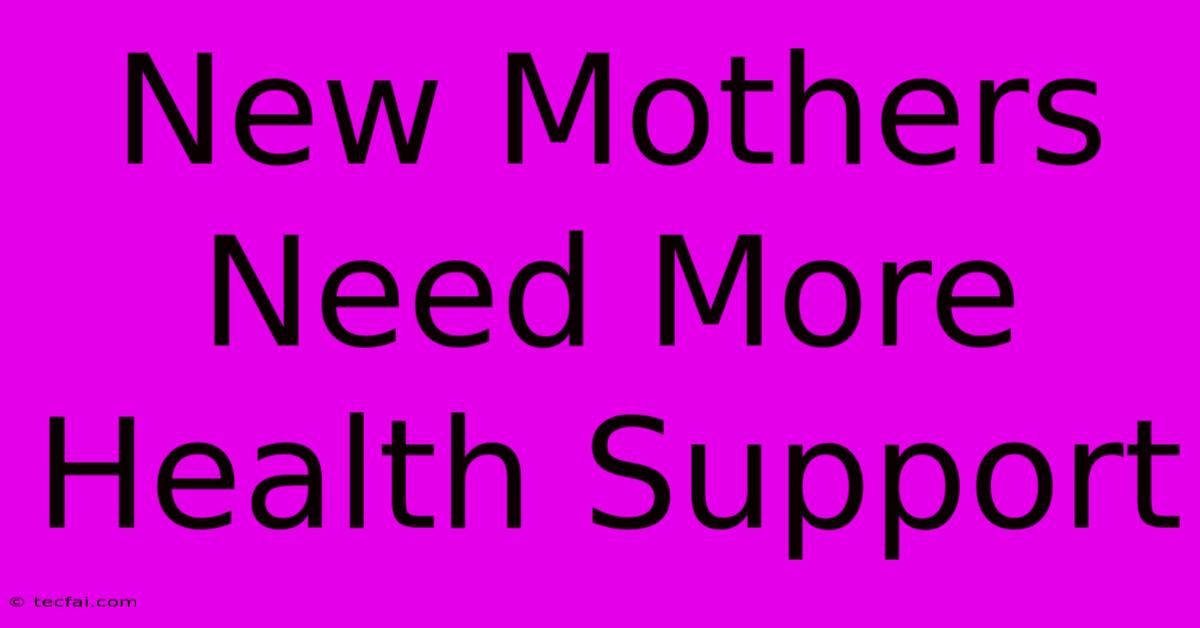New Mothers Need More Health Support

Discover more detailed and exciting information on our website. Click the link below to start your adventure: Visit Best Website tecfai.com. Don't miss out!
Table of Contents
New Mothers Need More Health Support: Addressing the Postpartum Health Gap
Becoming a mother is a transformative experience, filled with joy, excitement, and… overwhelming challenges. While the focus often centers on the miracle of childbirth, the crucial period after delivery—the postpartum period—is frequently underserved, leaving new mothers vulnerable and unsupported. This critical time demands significantly more comprehensive health support than is currently available in many regions.
The Postpartum Period: More Than Just Baby Blues
The postpartum period, extending from delivery until approximately six weeks later, is a time of significant physical and emotional upheaval. New mothers face a range of potential complications, including:
- Physical Changes: Hormonal shifts, potential bleeding (postpartum hemorrhage), wound healing (episiotomy or c-section), and the physical demands of breastfeeding or bottle-feeding can be taxing.
- Mental Health: Postpartum depression (PPD) and anxiety are serious conditions affecting a substantial number of new mothers. Symptoms range from mild sadness to severe debilitating illness, impacting both maternal and infant well-being. Postpartum obsessive-compulsive disorder (Postpartum OCD) and postpartum psychosis are also serious concerns.
- Sleep Deprivation: The relentless demands of caring for a newborn drastically impact sleep patterns, leading to exhaustion and exacerbating existing mental and physical health challenges.
- Relationship Dynamics: The transition to parenthood can strain relationships with partners, family, and friends, adding to the stress experienced by new mothers.
The Current Support System: Falling Short
Current support systems often fall short of meeting the multifaceted needs of new mothers. Many women lack access to:
- Affordable and Accessible Healthcare: The cost of postpartum checkups and mental health services can be prohibitive, especially for mothers lacking adequate insurance coverage. Geographical limitations also restrict access to specialized care.
- Sufficient Mental Health Services: The stigma surrounding mental illness often prevents women from seeking help, while the availability of qualified mental health professionals specializing in perinatal mental health remains inadequate.
- Comprehensive Postpartum Education: Many new mothers lack sufficient information about the physical and emotional changes they’ll experience, making it difficult to recognize potential problems and seek appropriate care.
- Robust Social Support Networks: The isolation felt by many new mothers is amplified by lack of readily available support from family, friends, or community programs.
The Path Towards Improved Support: A Multi-pronged Approach
Addressing the postpartum health gap requires a multifaceted approach encompassing:
- Increased Funding for Perinatal Mental Health Services: Investing in accessible, affordable mental health services, including therapy and medication, is critical. This includes training more professionals specializing in perinatal mental health.
- Expanded Access to Affordable Healthcare: Ensuring all new mothers have access to comprehensive postpartum checkups and ongoing care is paramount. This could involve expanding health insurance coverage and increasing the availability of community health clinics.
- Comprehensive Postpartum Education Programs: Implementing widespread education initiatives, utilizing various platforms, such as community workshops, online resources, and hospital-based programs, is crucial to equip new mothers with the knowledge they need to navigate this transition.
- Strengthening Social Support Networks: Creating and promoting support groups, peer mentoring programs, and community-based initiatives can offer vital emotional and practical assistance to new mothers.
Conclusion:
The postpartum period is a critical juncture in a woman's life, profoundly impacting her physical and mental well-being and consequently, her child's development. Addressing the gap in postpartum health support isn't merely about providing better care; it's about investing in the health and well-being of entire families. A collective effort involving healthcare professionals, policymakers, and communities is needed to ensure that all new mothers receive the support they deserve during this transformative and often challenging phase of their lives. By prioritizing and investing in comprehensive postpartum care, we can create a healthier future for mothers and their families.

Thank you for visiting our website wich cover about New Mothers Need More Health Support. We hope the information provided has been useful to you. Feel free to contact us if you have any questions or need further assistance. See you next time and dont miss to bookmark.
Featured Posts
-
Prebble Nz Fiscal Crisis Needs Change
Dec 03, 2024
-
Artetas Priority Isak And Gyokeres Passed Over
Dec 03, 2024
-
Player Arrives Barefoot To Snow Game
Dec 03, 2024
-
Super Leagues 2025 Free Agent List
Dec 03, 2024
-
Which Daughter Is Like Serena Williams
Dec 03, 2024
